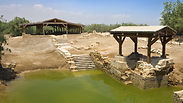
UNESCO settles Jesus baptism site controversy, says Jordan
Designation of World Heritage Site said to prove authentic biblical location does not lie in Israel, as Israeli officials deny existence of controversy.
The announcement of the Al Maghtas site in Jordan – believed by many Christians to be where Jesus was baptized – as a UNESCO World Heritage Site was greeted enthusiastically in that country on Sunday, with Jordanian newspaper Al Rai declaring that the move "put an end to the Israeli claims" that the authentic location is beyond the Jordan River in Israeli territory.
Israeli officials, for their part, insisted that there was no controversy over the site.
In 2011, Israel officially opened the Qasr el Yahud site on the west bank of the Jordan River after a decades-long closure. According to Jewish tradition, this was where the Israelites crossed the Jordan River as they entered Canaan, and supposedly was where Jesus was baptized.
Some in Jordan were then angered by the ceremonial reopening, claiming that Jesus was baptized by John the Baptist at the Jordanian location and noting that the Vatican had recognized this when Pope John Paul II was present at the ceremony marking the site's opening in 2000.
These voices accused Israel not only of rewriting history, but also of attempting to attract Christian tourism at Jordan's expense.
Al Rai wrote on Sunday that UNESCO's decision settled the matter. "Since the site was discovered, Israel has not stopped trying to deal it and attribute it to the occupied side of the Jordan River," said the paper. "This despite the religious and historical documents that prove that the baptism of Jesus, peace be unto him, is on the Jordanian side of the Jordan River."
The director of the EcoPeace Friends of the Earth Middle East, Gidon Bromberg, told Ynet that recognition of the Jordanian spot as a world heritage site points to the Hashemite kingdom's astuteness in advancing the issue and being aware of the potential tens of millions of Christian visitors interested in being baptized in the Jordan River.
Bromberg said the heritage site designation could hurt tourism at the Qasr al Yahud site. "As far as we know, around 300,000 Christian pilgrims arrive at the Israeli site every year, while on the Jordanian side the number is around 100,000 pilgrims a year."

However, despite the UNESCO listing, which will certainly boot tourism for the Jordanian site, Bromberg pointed to what he said was the real problem – one shared by Jordan, Israel, and the Palestinians: "Whether it's listed by UNESCO or not, ultimately the quantity and quality of the Jordan River's water is so poor."
Meanwhile, Israeli officials said there was no difference of opinion or battle against the Jordanians on the issue, and that "we are talking about pure anti-Israeli propaganda."
According to an Israeli official, the original Jordanian proposal to UNESCO stated that there were plans to expand the site in the future in cooperation with "the neighboring country". The Lebanese ambassador demanded changing the phrasing to "Palestine", a request that was accepted.
Diplomatic officials said that Israel had no problems with the Jordanian proposal and did not lobby against it – quite the opposite, in fact. The relations between the Israeli and Jordanian delegations to UNESCO are considered strong.
The Jordanian ambassador was one of of the first to congratulate the Israeli ambassador after the recognition Beit She'arim in the Galilee as a heritage site.
The Palestinians are also recognized as a state in UNESCO, so Israel was not in a position to prevent the textual change to Palestine anyway.
UNESCO's World Heritage Committee, which met in Bonn, Germany, declared the national park in Beit She'arim in the lower Galilee as a World Heritage Site on Sunday. Beit She'arim was a thriving village in biblical times, and the site includes 30 burial caves in which the noble class weere buried, including Rabbi Yehudah Hanasi, the writer of the Mishnah.
The site in Beit She'arim is one of nine UNESCO World Heritage Sites in Israel. Among the 21 member states, 17 states voted in favor of including Beit She'arim, including India, Turkey, and Senegal. Four states voted against the move -- Lebanon, Qatar, Algeria, and Malaysia.










